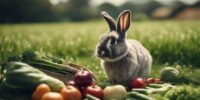How to Ensure a Balanced Diet for a British Giant Rabbit
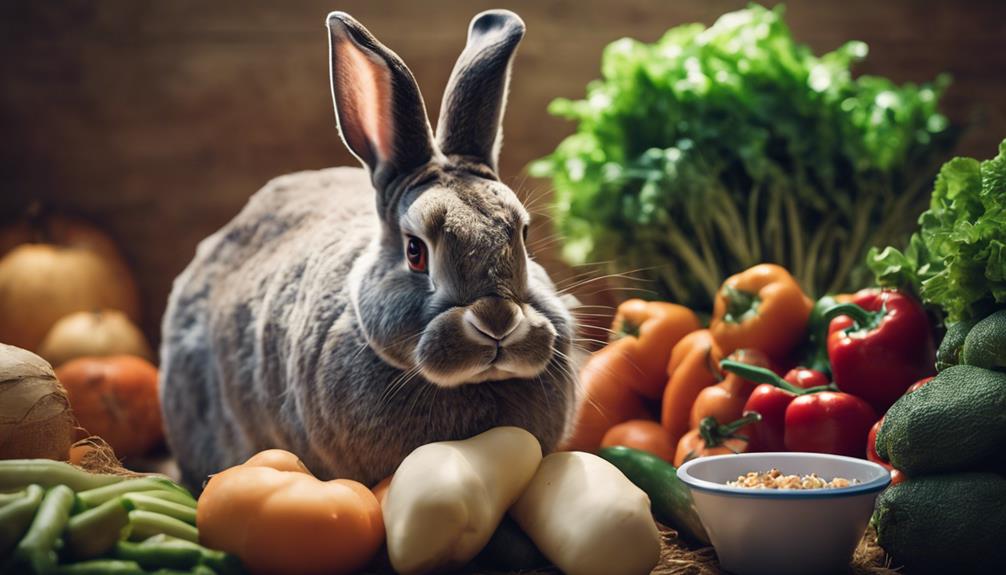
A balanced diet for a British Giant rabbit consists of high-quality hay, fresh vegetables, a limited amount of pellets, and access to clean water at all times.
Hay should make up the majority of their diet, with options such as timothy, orchard grass, or oat hay being suitable choices.
Fresh vegetables like dark leafy greens, carrots, and bell peppers can provide additional nutrients and variety to their diet.
Pellets should be given in moderation, as they can be high in calories and lead to obesity if overfed.
It's important to monitor your rabbit's weight and adjust their diet accordingly to ensure they maintain a healthy body condition.
Dietary Requirements for British Giant Rabbits
To ensure optimal health and well-being, British Giant rabbits have specific dietary requirements that must be carefully met. These rabbits require a high-fiber diet, similar to other rabbit breeds, to support their dental and digestive health. The foundation of their diet should be high-quality hay or fresh grass, which aids in proper digestion and helps maintain their dental hygiene by encouraging natural wear of their teeth.
In addition to hay or grass, British Giant rabbits should be supplemented with leafy greens, vegetables, and a small portion of high-quality rabbit pellets to ensure they receive a well-rounded diet. It's crucial to avoid overfeeding and limit high-sugar treats to prevent weight-related issues and maintain their overall health.
Monitoring their diet closely, adjusting food quantities as needed, and seeking guidance from a veterinarian for specific dietary recommendations are essential practices for ensuring the well-being of British Giant rabbits.
Importance of Hay and Grass

Hay and grass play a crucial role in the diet of British Giant rabbits. They're rich sources of fiber, essential for maintaining proper digestive health and preventing gastrointestinal complications.
Additionally, the act of chewing hay and grass helps wear down the rabbit's continuously growing teeth, promoting good dental hygiene.
Hay for Digestive Health
With their digestive health being paramount, British Giant rabbits benefit significantly from a diet rich in high-fiber hay and grass. Hay plays a crucial role in maintaining proper gut motility and preventing gastrointestinal issues in these rabbits.
The constant chewing required when consuming hay also helps wear down their continuously growing teeth, promoting dental health. Additionally, hay supports the natural foraging behavior of British Giant rabbits, keeping them mentally stimulated and physically active.
Including a variety of grasses in their diet can offer different textures and flavors, further enhancing their digestive well-being. Ensuring unlimited access to hay and grass is essential for the overall health and well-being of British Giant rabbits, making it a cornerstone of their diet.
Grass for Dental Care
Grass consumption plays a vital role in maintaining the dental health of British Giant rabbits, aiding in the natural wearing down of their teeth through consistent chewing. The abrasive texture of grass helps to file down the rabbit's continuously growing teeth, preventing them from becoming overgrown and causing dental issues.
Hay, which is also essential for dental care, provides a similar benefit. The act of chewing on hay and grass not only supports proper dental wear but also promotes good oral hygiene and prevents malocclusion.
Importance of Fiber
To ensure optimal health and digestion for British Giant rabbits, a high-fiber diet is essential, with hay and grass being key components that support proper dental wear and gut motility. Here are some crucial points emphasizing the importance of fiber-rich foods like hay and grass in a British Giant rabbit's diet:
- Hay and grass provide essential fiber that promotes healthy digestion.
- The chewing action required when consuming hay and grass helps wear down a rabbit's continuously growing teeth.
- Fiber-rich foods aid in preventing obesity by promoting a feeling of fullness without excess calories.
- Regular access to hay and grass is crucial for maintaining a healthy digestive system in British Giant rabbits.
- The fiber content in hay and grass supports gut motility, preventing gastrointestinal issues and maintaining overall well-being.
Incorporating Leafy Greens
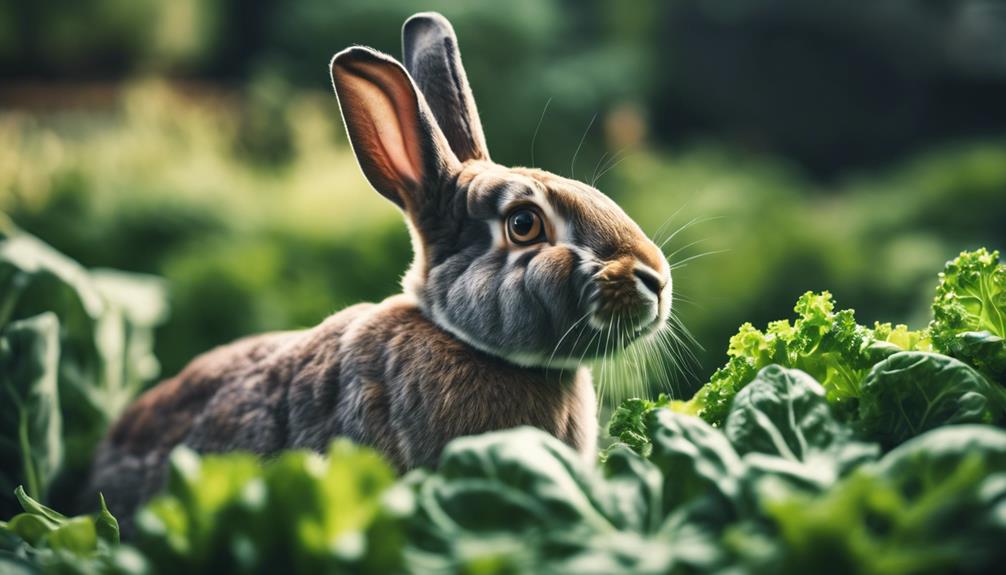
Safe leafy greens such as cabbage, kale, and broccoli are essential components of a British Giant Rabbit's diet, providing a plethora of nutrients.
Offering an adult-sized handful of leafy greens daily is crucial for maintaining the rabbit's health and ensuring a balanced diet.
Introducing a variety of 5-6 different types of leafy greens gradually can prevent digestive issues and offer nutritional diversity.
Nutrient-Rich Leafy Greens
When incorporating nutrient-rich leafy greens into the diet of your British Giant rabbit, ensure to rotate between a variety of safe options to provide essential vitamins and minerals. Here are some options to consider:
- Kale: High in vitamin A, C, and K, as well as calcium and fiber.
- Parsley: Rich in vitamin C, K, and antioxidants like beta-carotene.
- Broccoli: Contains vitamin C, K, and minerals such as calcium and potassium.
- Spinach: Packed with iron, vitamin A, C, and K for overall health.
- Romaine Lettuce: A good source of vitamin A, K, and folate for a balanced diet.
Proper Portion Sizes
Incorporating nutrient-rich leafy greens in proper portion sizes is crucial for maintaining the health and well-being of a British Giant rabbit. Offer an adult-sized handful of safe leafy greens daily to ensure essential nutrients and fiber intake.
To provide a balanced diet, include a variety of greens such as cabbage, kale, and broccoli to prevent boredom and ensure a diverse nutritional intake. Introduce new greens gradually to avoid digestive upsets, and monitor for any adverse reactions in the rabbit.
Feed 5-6 different types of leafy greens to offer a wide range of vitamins and minerals for optimal health. Consulting a vet for advice on safe plants and ensuring the greens are washed and dried before feeding are essential steps in caring for your rabbit's diet.
Selecting High-Quality Pellets

For a British Giant rabbit's optimal health, selecting high-quality pellets with a minimum fiber content of 18% is crucial. When choosing pellets for these large breed rabbits, consider the following:
- Fiber Content: Opt for pellets with a fiber content of at least 18% to support digestion.
- No Added Sugars or Artificial Colors: Look for pellets that are free from added sugars and artificial colors to maintain a healthy diet.
- Specifically Formulated for Large Breed Rabbits: Choose pellets that are specifically formulated for large breed rabbits to ensure they meet their unique nutritional needs.
- Avoid Excessive Protein: Steer clear of pellets with excessive protein content, as this can lead to health issues in British Giant rabbits.
- Consult a Veterinarian: Seek advice from a veterinarian to get personalized recommendations on selecting high-quality pellets tailored to your British Giant rabbit's specific requirements.
Offering Healthy Treats in Moderation
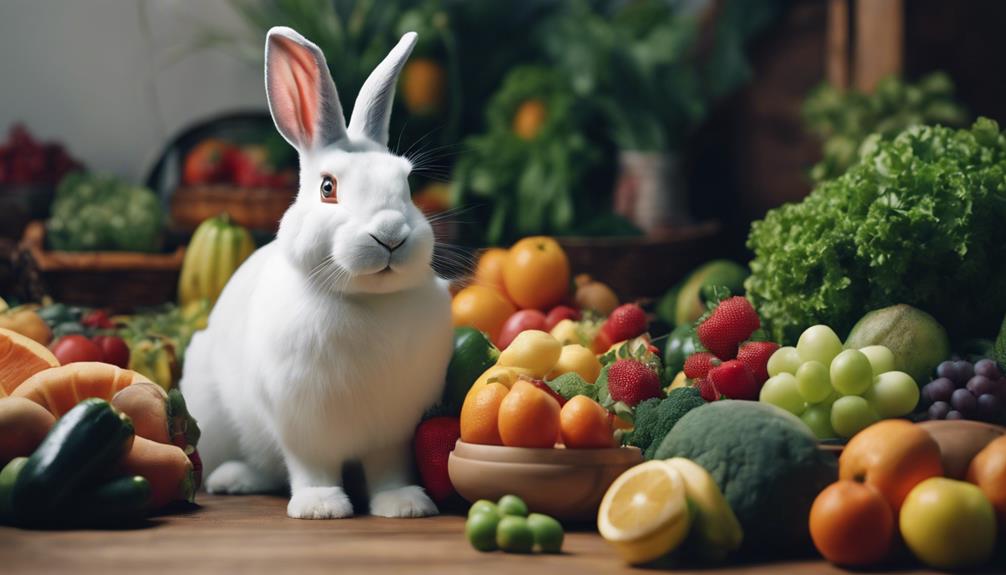
Healthy treats such as carrots and apples should be offered in moderation to maintain a balanced diet for British Giant Rabbits. While these treats can be a delightful addition to their diet, moderation is essential to prevent nutritional imbalances and obesity. Opting for healthy treats over high-sugar or high-fat options is crucial for the overall health of British Giant Rabbits. When offering treats, it's important to consider portion sizes and frequency to avoid overfeeding.
Treat feeding time can also serve as an opportunity for enrichment and bonding with your British Giant Rabbit. By offering small, appropriate treats, you can strengthen your relationship with your pet while ensuring they enjoy a varied diet. Consulting with a veterinarian can provide specific recommendations on healthy treat options and quantities tailored to your rabbit's individual needs.
Hydration With Fresh Water
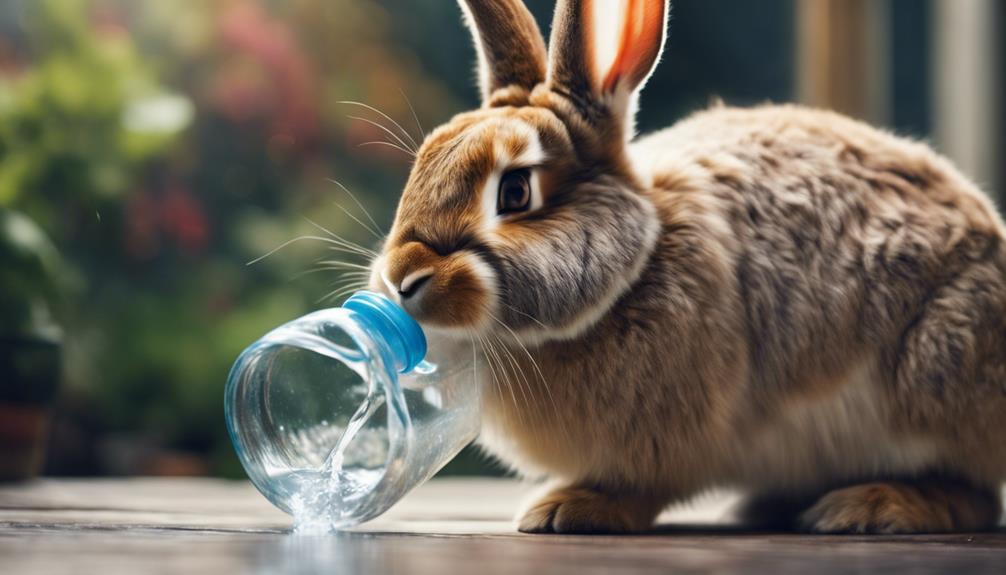
When providing hydration for a British Giant Rabbit, it's crucial to offer fresh, clean water in a suitable container to promote optimal health and well-being. Here are some essential tips to ensure proper hydration:
- Use a Heavy Ceramic Bowl or Drip-feed Bottle: Provide water in a heavy ceramic bowl or a drip-feed bottle to prevent spills and contamination.
- Prevent Algae in Summer and Freezing in Winter: Regularly check the water for algae during summer and prevent freezing in winter to maintain hydration levels.
- Daily Inspection of Water Bottles: Check the water bottles daily to ensure they're accessible and clean, allowing the rabbit to drink easily.
- Monitor Water Intake: Regularly monitor the water intake of your British Giant Rabbit and adjust as needed to prevent dehydration.
- Choose the Right Container: Use either a water bowl or bottle based on the rabbit's preference to encourage adequate water consumption.
Monitoring Weight and Adjusting Diet
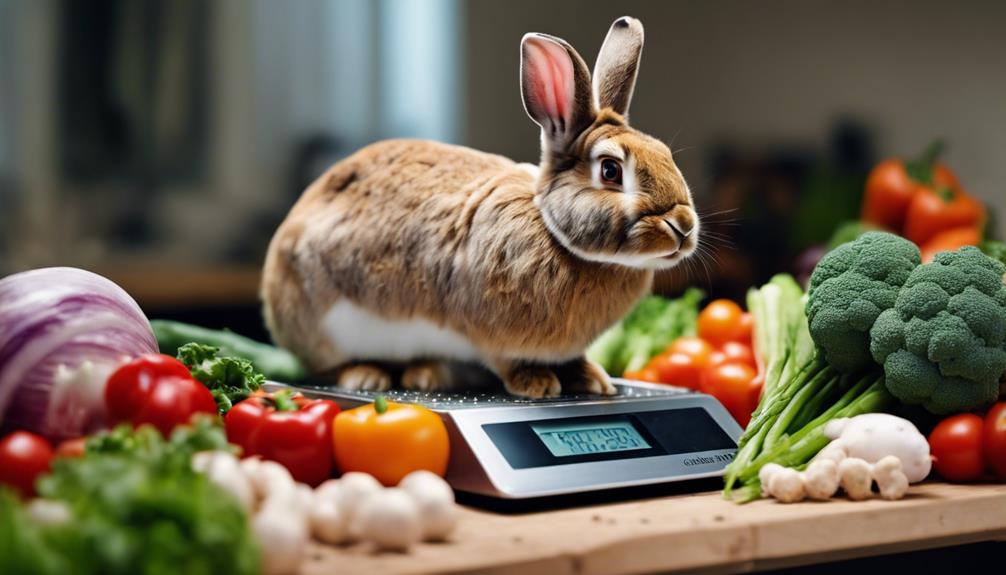
Regularly monitoring the weight of your British Giant rabbit is essential to ensure they maintain a healthy balance and adjusting their diet accordingly. Weight monitoring allows you to track any fluctuations that may indicate underlying health issues or improper nutrition.
If you notice significant weight changes, it's crucial to make timely diet adjustments to meet your rabbit's specific dietary requirements. Consulting a veterinarian is recommended when modifying the diet to ensure it aligns with your rabbit's age, activity level, and any existing health conditions.
Veterinarians can provide valuable insights into the appropriate caloric intake and nutritional balance needed for your British Giant rabbit based on their individual needs.
Frequently Asked Questions
What Is a Balanced Diet for a Rabbit?
A balanced diet for a rabbit includes dietary supplements, fresh vegetables, and pellet variety. It's crucial to provide a mix of nutrients for optimal health. Monitoring intake and offering a diverse selection of foods ensures a well-rounded diet.
How Do You Properly Feed a Rabbit?
Rabbits have diverse food preferences, needing hay, pellets, and leafy greens daily. Establish a regular feeding schedule and limit treats like fruits. Monitor consumption closely and vary the diet to ensure balanced nutrition and health.
What Are the Nutrition and Feeding Requirements for Rabbits?
Ensuring optimal rabbit health involves meeting nutritional needs through a balanced diet rich in fiber, hay, and leafy greens. A consistent feeding schedule with high-quality pellets complements their diet. Monitoring sugar intake maintains a healthy diet.
How Much Should You Feed a Giant Rabbit?
When feeding a giant rabbit, ensure a consistent feeding schedule with proper portion sizes. Incorporate dietary restrictions for special treats. Manage weight by adjusting food variety as needed. Regularly monitor the rabbit's body condition for optimal health.


